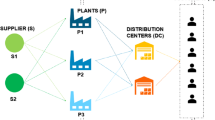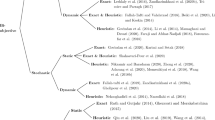Abstract
In this paper, a more general version of the flow shop scheduling problem with the objective of minimizing the total flow time is investigated. In order to get closer to the actual conditions of the problem, some realistic assumptions including non-permutation scheduling, learning effect, multiple availability constraints, and release times are considered. It is assumed that the real processing time of each job on a machine depends on the position of that job in the sequence, and after processing a specified number of jobs at each machine, an unavailability period is occurring because of maintenance activities. Moreover, it is supposed that each job may not be ready for processing at time zero and may have a release time. According to these assumptions, a new mixed integer linear programming (MILP) model is proposed to formulate the problem. Due to the high complexity of the problem, a heuristic method and a simulated annealing algorithm are presented to find the nearly optimal solutions for medium- and large-sized problems. To obtain better and more robust solutions, the Taguchi method is used in order to calibrate the simulated annealing algorithm parameters. Finally, the computational results are provided for evaluating the performance and effectiveness of the proposed solution methods.
Similar content being viewed by others
References
Biskup D (1999) Single-machine scheduling with learning considerations. Eur J Oper Res 8:115–173
Biskup D (2008) A state-of-the-art review on scheduling with learning effects. Eur J Oper Res 188:315–329
Wang J-B, Xia Z-Q (2005) Flow-shop scheduling with a learning effect. J Oper Res Soc 56:1325–1330
Wang J-B (2006) A note on scheduling problems with learning effects and deteriorating jobs. Int J Syst Sci 37:827–833
Cheng TCE, Wu C-C, Lee W-C (2008) Some scheduling problems with deteriorating jobs and learning effects. Comput Ind Eng 54:972–982
Wu C-C, Lee W-C (2009) A note on the total completion time problem in a permutation flowshop with a learning effect. Eur J Oper Res 192:343–347
Wu C-C, Lee W-C (2009) Single-machine and flowshop scheduling with a general learning effect model. Comput Ind Eng 56:1553–1558
Yin Y, Xu D, Sun K, Li H (2009) Some scheduling problems with general position-dependent and time-dependent learning effects. Inf Sci 179:2416–2425
Lee W-C, Wu C-C (2009) Some single-machine and m-machine flowshop scheduling problems with learning considerations. Inf Sci 179:3885–3892
Chung Y-H, Tong L-I (2011) Makespan minimization for m-machine permutation flowshop scheduling problem with learning considerations. Int J Adv Manuf Technol 56:355–367
Schmidt G (2000) Scheduling with limited machine availability. Eur J Oper Res 121:1–15
Ma Y, Chu C, Zuo C (2010) A survey of scheduling with deterministic machine availability constraints. Comput Ind Eng 58:199–211
Aggoune R (2004) Minimizing the makespan for the flow shop scheduling problem with availability constraints. Eur J Oper Res 153:534–543
Aggoune R, Portmann M-C (2006) Flowshop scheduling problem with limited machine availability: a heuristic approach. Int J Prod Econ 99:4–15
Perez-Gonzalez P, Framinan J (2009) Scheduling permutation flowshops with initial availability constraint: analysis of solutions and constructive heuristics. Comput Oper Res 36:2866–2876
Safari E, Sadjadi SJ, Shahanaghi K (2010) Scheduling flowshops with condition-based maintenance constraint to minimize expected makespan. Int J Adv Manuf Technol 46(5–8):757–767
Hsu C-J, Low C, Su C-T (2010) A single-machine scheduling problem with maintenance activities to minimize makespan. Appl Math Comput 215:3929–3935
Liao L-M, Tsai C-H (2009) Heuristic algorithms for two-machine flowshop with availability constraints. Comput Ind Eng 56:306–311
Wu C-C, Lee W-C (2007) A note on single-machine scheduling with learning effect and an availability constraint. Int J Adv Manuf Technol 33:540–544
Ghodratnama A, Rabbani M, Tavakkoli-Moghaddam R, Baboli A (2010) Solving a single-machine scheduling problem with maintenance, job deterioration and learning effect by simulated annealing. J Manuf Syst 29:1–9
Yang S-J (2010) Single-machine scheduling problems with both start-time dependent learning and position dependent aging effects under deteriorating maintenance consideration. Appl Math Comput 217:3321–3329
Vahedi-Nouri B, Fattahi P, Rohaninejad M, Tavakkoli-Moghaddam R (2012) Minimizing the total completion time on a single machine with the learning effect and multiple availability constraints. Appl Math Model 37(5):3126–3137
Sadjadi SJ, Aryanezhad MB, Ziaee M (2008) The general flowshop scheduling problem: mathematical models. J Appl Sci 8(17):3032–3037
Mehravaran Y, Logendran R (2012) Non-permutation flowshop scheduling in a supply chain with sequence-dependent setup times. Int J Prod Econ 135(2):953–963
Lee W-C, Wu C-C (2004) Minimizing total completion time in a two-machine flowshop with a learning effect. Int J Prod Econ 88:85–93
Graham RL, Lawler EL, Lenstra JK, Rinnooy KA (1979) Optimization and approximation in deterministic sequencing and scheduling: a survey. Ann Oper Res 5:287–326
Nawaz M, Enscore EE, Ham I (1983) A heuristic algorithm for the m-machine, n-job flowshop sequencing problem. OMEGA 11:91–95
Framinan JM, Leisten R, Ruiz-Usano R (2002) Efficient heuristics for flowshop sequencing with the objectives of makespan and flowtime minimization. Eur J Oper Res 141:559–569
Kirkpatrick S, Gelatt C, Vecchi M (1983) Optimization by simulated annealing. Science 220(4598):671–680
Phadke MS (1989) Quality engineering using robust design. Prentice-Hall, Upper Saddle River
Wu CFJ, Hamada MS (2000) Experiments: planning, analysis, and parameter design optimization. Wiley
Author information
Authors and Affiliations
Corresponding author
Rights and permissions
About this article
Cite this article
Vahedi-Nouri, B., Fattahi, P., Tavakkoli-Moghaddam, R. et al. A general flow shop scheduling problem with consideration of position-based learning effect and multiple availability constraints. Int J Adv Manuf Technol 73, 601–611 (2014). https://doi.org/10.1007/s00170-014-5841-4
Received:
Accepted:
Published:
Issue Date:
DOI: https://doi.org/10.1007/s00170-014-5841-4




